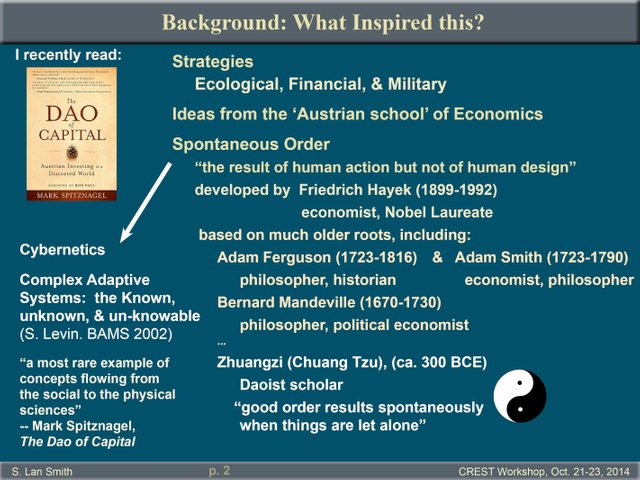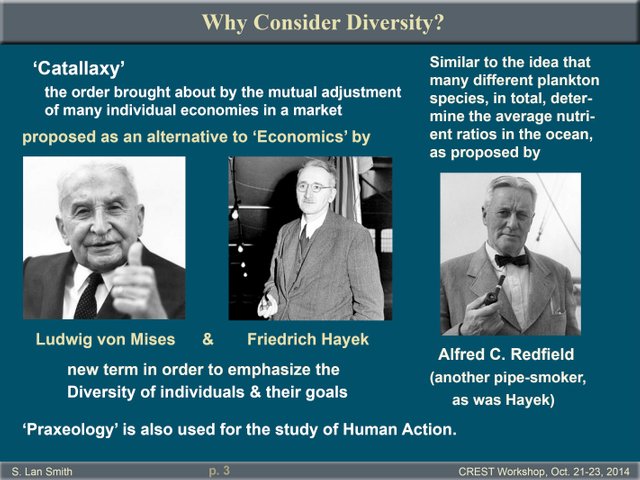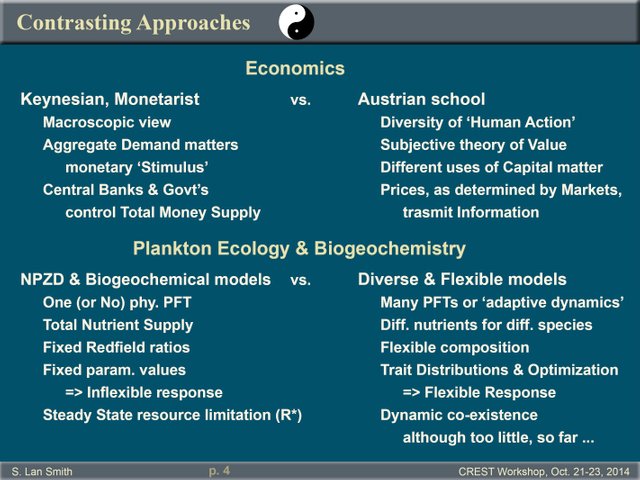Parallels between the Contrasting Approaches within Ecology and Economics, respectively
Ecology
Macro-scale Approach
Even years ago this was certainly not the only approach to ecology. However, for considering the regional and global scales, it has dominated. Partly this is because it has not been possible to get sufficient observations and information about biodiversity over large areas (continents, oceans, or the whole Earth).
Even though such observations and information are beginning to become available, the macro-scale approach is still applied when considering the global scale cycles of elements such as major nutrients (e.g., nitrogen, phosphorus) and carbon as they relate to life. That field of study has come to be called biogeochemistry (with more emphasis on the chemistry) or biogeoscience (for a broader emphasis).
Biogeochemistry and Biogeoscience
These terms refer to the combination of biological (including ecological), geological, and chemical processes and their interactions. Many people consider these topics to be quite important and interesting, and so many journals and conferences now specialize on them. There’s a very good journal called Global Biogeochemical Cycles, another called called Journal of Geophysical Research – Biogeosciences, and the open access journal Biogeosciences. There are many others that publish research on this topic.
Newer Diversity-centric Approach
Both in observational and theoretical modeling studies, this approach has been applied much more in recent years. Biodiversity is a hot topic, for good reason. Recently developed sensors and instruments are cheaper, smaller, and more automated, allowing the collection of much more data from observations.
Of course this approach is centered in ecology. However, it’s also very important for understanding the cycles of nutrients and carbon on our planet. Such biogeochemical cycles are largely mediated by a great diversity of living organisms, and of course the nutrients and carbon are vital to sustaining life as we know it. It was from my studies of biogeochemical cycles that I got interested in ecology.
Economics

Macro-economics and the Keynesian school
The ‘macro-economic’ view emphasizes the large-scale dynamics of the economy and focuses attention on large-scale metrics such as total money supply and the ‘velocity of money’. This directly parallels, and mostly predates, the large-scale biogeochemical approach introduced above, in which nutrient supply would be the analogue of money supply.
The economic approach and views of John Maynard Keynes and derivatives thereof today dominate among academics and central bankers. That’s not coincidental, because the central banks, either directly or indirectly, fund many economic studies and provide many jobs for economists. Keynes was brilliant, but he also provided intellectual justification for massive money printing by central banks. That has greatly enhanced the power of those who own and control the central banks, while simultaneously impoverishing many ordinary folks. To be fair, Keynes himself might arguably not condone much of what is being done today with justifications supposedly based on his work. I’m thinking of the ever-faster money printing, massive bailouts, and negative interest rate policies (NIRP).
Austrian School
This quite different school of economic thought began in the late 1800s with Carl Menger. He came to study economics because as a journalist he found that the ways that prices were actually determined did not agree with the economic theories of his day. Mark Spitznagel gives a good and relatively brief introduction to the history of the Austrian school in a few chapters of his book, The Dao of Capital.
Briefly, this school came to emphasize the motivations of and the subjective value perceived by individual human beings, rather than the macroscopic view typical of Keynesian and other macro-economic approaches. Thus it very much parallels, and predates by over a century, the recent emphasis on biodiversity in ecology and biogeochemistry.
In this video Hans-Hermann Hoppe introduces Praxeology, the study of human action, which is central to the Austrian school of economics and discusses the nature of economics as a science.
Some Parallels
Here I’ll share three slides that I originally presented at a Workshop focusing on plankton biodiversity late in 2014. I updated them a bit for this post. At that time I had recently read The Dao of Capital, which provoked me to think more about unifying what I knew of ecology from my day job with what I knew from my hobby of reading and following podcasts about economics.
First, an introduction to the idea of Spontaneous Order, which is essentially the same as that of Emergent Properties in Complex Adaptive Systems.

Then, comparing the ideas of two influential Austrian economists with the most famous result from an influential pioneer of biogeochemistry.

I find it quite interesting the extent of the parallels between the two contrasting approaches within economics and ecology, respectively.

Contrast in the Dominance of the two Approaches
It’s also interesting to consider the sharp contrast in the dominance of these contrasting approaches within each field of study today. In the natural sciences of ecology and biogeochemistry, almost no one opposes the view that biodiversity should be considered because it plays such an important role. Even those who adopt the older-style macro-scale view for certain biogeochemical studies acknowledge that they cannot resolve important details using that approach.
By contrast, in economics many still reject and strongly object to the Austrian view, in favor of the Keynesian macro-economic approach. I strongly suspect that a major reason for this difference is that ecologists and those who study biogeochemistry don’t get rewarded for holding a particular view nearly so much as economists do. I’ve heard that it can be quite difficult for Austrian school economists to find jobs in academia. Of course given that Austrian school economists tend to condemn the central planning typical of central banks, it’s no wonder that the central bankers and intellectuals in their pay do not want to fund or support Austrian school economists.
S. Lan Smith
Kamakura, Japan
September 13, 2016
Thanks to those who provided the images, all of which were labeled for free reuse.
Love some of the interesting parallels you've come up with.
Thanks. I'm still enjoying learning about economics and comparing it with ecology.